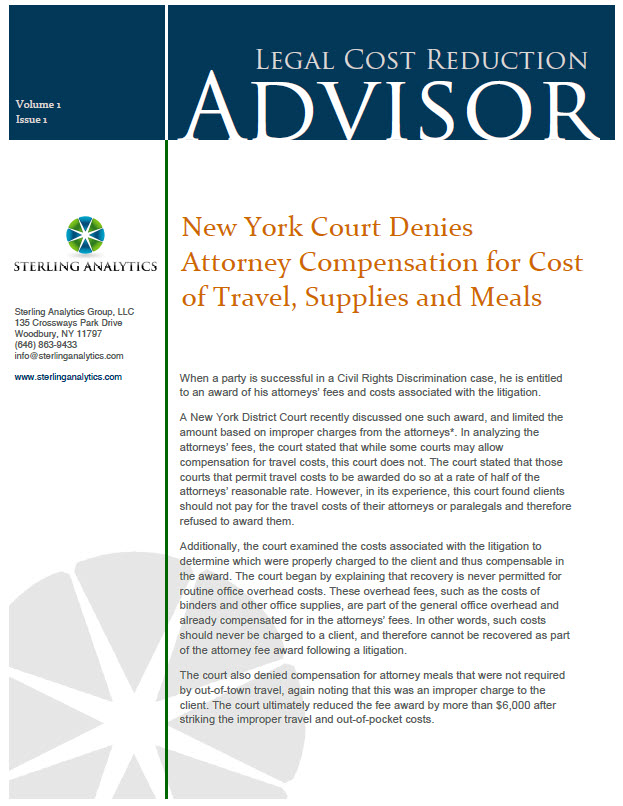When a party is successful in a Civil Rights Discrimination case, he is entitled to an award of his attorneys’ fees and costs associated with the litigation.
A New York District Court recently discussed one such award, and limited the amount based on improper charges from the attorneys.* In analyzing the attorneys’ fees, the court stated that while some courts may allow compensation for travel costs, this court does not. The court stated that those courts that permit travel costs to be awarded do so at a rate of half of the attorneys’ reasonable rate. However, in its experience, this court found clients should not pay for the travel costs of their attorneys or paralegals and therefore refused to award them.
Additionally, the court examined the costs associated with the litigation to determine which were properly charged to the client and thus compensable in the award. The court began by explaining that recovery is never permitted for routine office overhead costs. These overhead fees, such as the costs of binders and other office supplies, are part of the general office overhead and already compensated for in the attorneys’ fees. In other words, such costs should never be charged to a client, and therefore cannot be recovered as part of the attorney fee award following a litigation.
The court also denied compensation for attorney meals that were not required by out-of-town travel, again noting that this was an improper charge to the client. The court ultimately reduced the fee award by more than $6,000 after striking the improper travel and out-of-pocket costs.
Implications for Legal Billing: As a client, it is important to know what your attorneys may properly charge you for, and to take steps to ensure your legal bills are accurate. While your attorneys may be required to travel as part of your effective representation, you may not be required to reimburse them for their entire cost to do so.
Although this court did not allow the charge, some courts will, and therefore it is important to have clear rules established in your legal billing guidelines. At most, you should agree to pay half of the attorneys’ regular fee for their travel time, not the full amount. You may also require that you only be billed for travel costs purely associated with your legal matter. In other words, state that your attorney cannot charge every client for his travels cost for attending multiple hearings in one day.
Additionally, it is important to establish beforehand that you should not be responsible for general office overhead charges or attorney meals. Office supplies such as binders, exhibit tabs, and computer paper should be compensated through the attorneys’ fees, and not billed individually to you as the client. Having such guidelines established prior to your representation will help to ensure your legal bills are as accurate and proper as possible.
* Tatum v. City of New York, 2010 WL 334975 (S.D.N.Y. 2010). Full copies of court decisions may be available through counsel or through various Internet links or paid services.
By Lauren Stulmaker


